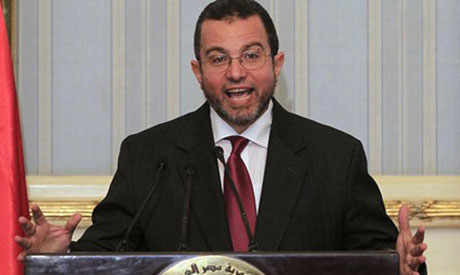 Egyptian Prime Minister Hisham Qandil has called on Egyptians to channel their energies into "building the country" and not to take part in protests or clashes.
Egyptian Prime Minister Hisham Qandil has called on Egyptians to channel their energies into "building the country" and not to take part in protests or clashes.
"In order for the revolution to realise its demands, we must finish with slogans and chants and start focusing on actual work," he said at a televised press conference at cabinet headquarters on Monday afternoon.
Qandil called on Egyptians to "stop protesting and start building the homeland" as economic issues need to be addressed "urgently." He went on to urge Egyptians to "ignore the media" and "switch off your TV sets and get to work instead."
Qandil also asserted that all sectors of the economy were rigged with structural problems that need to be addressed immediately, and that Egypt's economic situation needed to be dealt with before it reached catastrophic levels.
"We need to work side by side to safeguard the economy and this requires honest effort on the part of all sectors of society," said Qandil.
The prime minister went on to say that Egypt was well poised to attract foreign investment, as its strategic geographical position could allow it to become a regional "trade hub" catering to almost 2 billion consumers.
Egypt will host an economic forum next week that is expected to be attended by international experts, with the purpose of promoting investments and boosting confidence in Egypt's "prosperous future," the prime minister declared.
The Egyptian economy is currently experiencing tough times, with a budget deficit that hit a record LE91.5 billion in the first half of the current fiscal year. Egypt's foreign reserves have dwindled to a critical $15 billion, barely enough to cover three months of imports.
A $4.78 billion IMF loan deal meant to offset Egypt's growing budget deficit was postponed in November following a wave of political unrest that hit the country.
The prime minister urged all of Egypt's political forces to ignore ideological differences and work for the country's benefit.
"We hope that all political forces will put the nation's best interests before their own personal interests," he said.
Opponents and supporters of President Mohamed Morsi have been at loggerheads for months, while tensions have been high since 25 January, the second anniversary of Egypt's 2011 revolution, which was followed by days of political violence across the nation.
In recent weeks, tens of thousands of protesters repeatedly gathered in cities nationwide to express their opposition to Morsi and the Muslim Brotherhood group from which he hails, and which critics allege is effectively governing Egypt.
Three cities along Egypt's Suez Canal are currently under a month-long state of emergency – including daily curfews – following days of clashes between anti-government protesters and security forces. President Morsi has allowed the cities' governors to ease curfew restrictions depending on the local security situation.
Ismailia and Suez have both witnessed anti-government protests and intermittent clashes over the course of the last week. In Suez, at least nine people – including one police conscript – have been killed, while at least one civilian has been killed in Ismailia.
On 26 January, a criminal court sentenced 21 Port Said residents to death for their involvement in the Port Said stadium disaster in February 2012. The decision sparked uproar and more than 40 people have since been killed in violent protests in the city.
"Anyone who saw Tahrir Square during the [2011] revolution and [Tahrir Square] these days would know the difference," said Qandil.
Condemning recent political violence, the prime minister added: "Now we must be more constructive."
On Egypt's police and security forces, which have been subject to considerable criticisms recently, Qandil said: "The police force is a national establishment, and if it makes mistakes we should correct it."
A video showing a naked man being beaten and dragged by police in the vicinity of Cairo's presidential palace shown on television Friday evening sparked nationwide outrage. Investigations into the incident remain ongoing.



